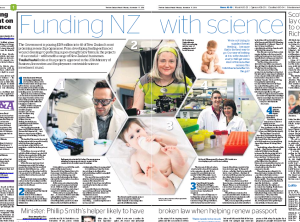Following up on the Government’s recent announcement that it is investing $139 million into 48 of New Zealand’s most promising research programmes, Teuila Fuatai at The New Zealand Herald takes a look at four of the projects that have been approved in the 2014 Ministry of Business, Innovation and Employment contestable science investment round.

An excerpt (read in full here):
1. Keratin-based wound dressings. AgResearch.
Derived from sheep wool, keratin-based dressings are a gift to chronic wound sufferers around the world, with scientific research showing they are effective in healing seven out of 10 cases.
AgResearch scientists Dr Stefan Clerens and Dr Sonya Scott have been approved $1.6 million over a four-year period for a project investigating what makes the bandages so effective.
…
2. Food safe: real time bacterial count. University of Auckland.
Meat is New Zealand’s second most lucrative overseas market, with red meat exports alone worth $2.76 billion in the six months to March 31.
Food safety is crucial to this multi-billion dollar industry, and University of Auckland physicist Dr Frederique Vanholsbeeck is in the process of developing a special device which eliminates the three-day wait for bacterial level results in a meat sample.
…
3. Functional Formula. University of Otago.
Professor Gerald Tannock’s “Functional Formula” project is now in its second phase of research.
The University of Otago microbiologist launched into the project, which looks at a particular type of bacteria living in the gut of babies, with Victoria University Ferrier Research Institute scientist Dr Ian Sims two years ago.
…
4. Bioactive gels for skeletal repair. University of Auckland.
Recovering from a bone fracture can be a painful process.
Each year, about 86,000 New Zealanders suffer from one. Of these, between 8 and 20 per cent fail to heal properly.
The Auckland University Bone and Joint Research group, headed by Dr David Musson and Dr Jill Cornish from the university’s school of medicine, are developing a special gel aimed at aiding these cases.